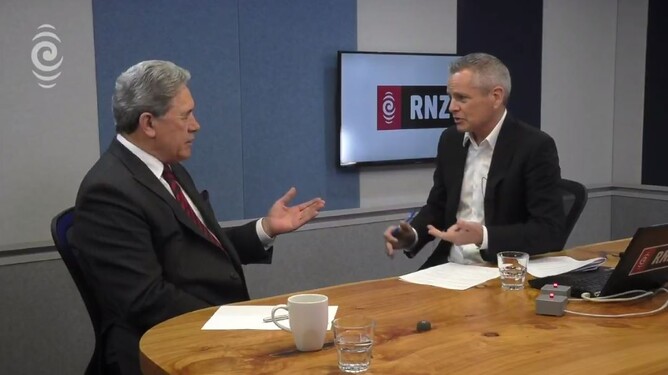As an avid consumer of media, I’ve always got an ear out for a good interview. And I heard an absolute humdinger on Radio New Zealand in the car on the way to work this morning:
New Zealand First leader Winston Peters appeared on Radio New Zealand as part of their pre-election The Leader Interview series. Find the interview here: it starts at the 20 minute mark): http://www.radionz.co.nz/news/political/339374/the-leader-interview-winston-peters
Normally political interviews are a giant turn-off for me, but this was a classic match-up: rude, personal, unprepared and combative on one side, while calm persistence stalked relentlessly on the other. It was so good/bad that even after arriving in my car parking spot I ended up sitting in my car for 10 minutes listening to it: god only knows what people arriving into the car park for work in the morning thought of this obviously strange man throwing his hands in the air every few seconds.
After a gentle intro, it started to heat up when Guyon asked the question: “How come you’ve been sacked three times as a Minister?” But that was merely an aperitif: a frothy amuse-bouche before the main course was served.
It arrived on a silver platter (at the 27 minute mark of the YouTube clip) when the interview turned to NZ First policies, and Winston tells Guyon off for wasting the first ten minutes of the interview not talking about them.
The first policy to come up is the proposal to take GST off food. “No,” says Winston, “off basic food,” which he says would take about $600m-$700m off the cost of food for people.
“But it’s a $3 billion policy – it says that on your website,” says Guyon.
“Well it might say that on the website, but it should have been corrected,” says Winston.
“Oh, come on,” says Guyon. And we’re into it.
“Come on mate,” says Guyon, “how are voters supposed to know when they look at your website and they see it there and you’re saying it’s wrong?”
Bluster, blither, blather.
“I mean, this is laughable isn’t it? You’re asking for full disclosure from Labour and criticising them, and you can’t even get your own numbers right,” says Guyon.
Then the debate turns to the difference between “most of the food an average family puts in their supermarket trolley” and ‘basic food’. Winston: “If you have difficulty understanding it, ask your grandmother.” Chips? Not basic food. A packet of biscuits? Not basic food. Bread? Yes.
“Who decides what basic food is?” asks Guyon. “We ask our grandmothers, we go up to the till and say what?”
“It will be listed by people who are every day… ordinary people who understand… common English”, says Winston, looking a little uncomfortable and sounding (to me) suspiciously like he is starting to make things up as he goes along.
“So who draws up this list?”
“I’d get a team together of everyday New Zealanders and we’d come up with a list of what basic means.”
“So how can you figure it is $600 million if you don’t even know what it includes?”
“I got a couple of economists onto it.”
“When did you do that?”
“About three and a half years ago.”
“So why did you say there was a mistake on your website only two days ago?”
Ouch.
“So do we take the policies on your website seriously or not?”
Ouch.
And it goes from there. Tax: “what does your proposal cost?” “I was a former Treasurer, I’ve got a good idea of what I am talking about, a lot more experience than you Guyon, it’s not a cost, it will be an earner…”
“What is it?”
“2.5 billion.”
“Over what time?”
And it goes on – and lifts a level when Winston asks “what else would you like to try and dispute here, and become an amateur Treasurer?”
Oh, so good. Unruffled, Guyon persists, getting into exports, which seems to confuse Winston, as he starts laying into the interviewer for having “radically non-performing policy”. Cue lots of talking over each other, until Winston says: “Stop right there, before you makes yourself a self-appointed genius.”
“So you can’t tell us the cost.”
No.
And on into bringing the energy companies back into national ownership, writing off student loan debt (“please Guyon don’t sit here like you know what you’re talking about”), low interest rates for first home buyers (“it’s your ideas that have destroyed people’s hopes in this country” says Winston, warming to it. “I think your ideas are preposterous, they are stupid, they’re ridiculous”)…
“Let’s talk about your policy,” says Guyon.
“You don’t know what you’re talking about,” retorts Winston.
And this truly brilliant interview concludes with Guyon, talking about post-election MMP partnership conversations, asks Winston “what do you want?”
“What do you mean?” (pause) “What do you mean?” “What do you mean by a statement like that, ten days out from the election?”
“It’s a question.”
And then Winston starts singing “what you want, what you need, what do you get?” I think he was aiming at the Quo, but the effect was altogether more threatening than Francis Rossi had ever intended. “This is pathetic,” says Winston.
From the sublime to the ridiculous, this interview had it all – a calm, well-prepared and persistent interviewer, a seemingly unprepared, irritable interviewee, and of course us, the audience making our own judgement.
Normally in our blog we try to dissect topical items and show how you can communicate better, but this was just so good that I think it does it all by itself.
I recommend you watch it - and enjoy it as much as I did.
George Hulbert

